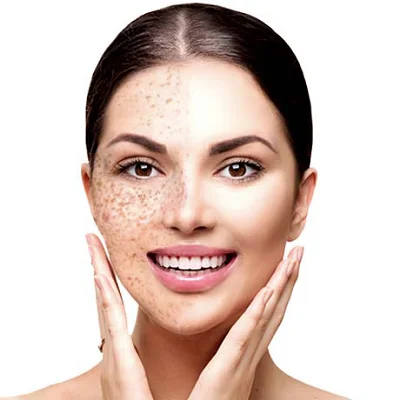
Hyperpigmentation is a common skin condition characterized by the darkening of certain areas of the body. It occurs when there is an excess production of melanin, the pigment responsible for skin color. While hyperpigmentation is usually harmless, it can be a source of self-consciousness and affect one’s self-esteem.
In this informative blog, we will explore various effective hyperpigmentation treatments in Islamabad and lifestyle changes that can help in treating hyperpigmentation in the body. So, don’t miss the details!
Understanding the Types of Hyperpigmentation:
Before delving into the treatments, it is essential to identify the different types of hyperpigmentation:
- Melasma: Typically appearing as symmetrical patches on the face, melasma is commonly associated with hormonal changes during pregnancy or due to the use of oral contraceptives.
- Post-Inflammatory Hyperpigmentation: This type of hyperpigmentation occurs after an inflammatory skin condition such as acne, eczema, or a skin injury. PIH can affect any area of the body and is more common in individuals with darker skin tones.
- Sunspots: Also known as solar lentigines or age spots, sunspots are caused by prolonged sun exposure and tend to appear on areas regularly exposed to the sun, such as the face, hands, and shoulders.
Effective Treatments for Hyperpigmentation:
Topical Treatments:
- Hydroquinone: A commonly used skin-lightening agent, hydroquinone works by inhibiting melanin production. It is available over-the-counter or in prescription strength.
- Retinoids: Derived from vitamin A, retinoids can help lighten hyperpigmentation by accelerating skin cell turnover and promoting the shedding of darkened skin cells.
- Vitamin C: This powerful antioxidant helps to inhibit melanin production while also brightening and evening out the skin tone. Look for serums or creams containing stabilized vitamin C.
- Kojic Acid: Derived from certain fungi, kojic acid has skin-lightening properties and is effective in treating hyperpigmentation caused by melasma and PIH.
- Azelaic Acid: Known for its antimicrobial and anti-inflammatory properties, azelaic acid can help fade hyperpigmentation while also controlling acne and reducing redness.
Chemical Peels:
Chemical peels involve the application of a chemical solution to the skin, which exfoliates the top layer, revealing fresh and evenly toned skin underneath. Chemical peels are available in various strengths and can be tailored to target specific types of hyperpigmentation.
Laser Therapy:
Laser treatments, such as intense pulsed light (IPL) and fractional laser resurfacing, can effectively target hyperpigmentation by breaking down excess melanin in the skin. Multiple sessions may be required for optimal results.
Microdermabrasion:
Microdermabrasion involves the use of a handheld device to gently exfoliate the top layer of the skin. This procedure can help reduce the appearance of hyperpigmentation by promoting skin cell turnover and stimulating collagen production.
Dermabrasion:
It is a more intensive procedure that involves the removal of the top layer of the skin using a rotating brush or diamond wheel. It is typically reserved for severe cases of hyperpigmentation.
Lifestyle Changes and Preventive Measures:
- Sun Protection: Sun exposure can worsen hyperpigmentation, so it is crucial to protect your skin from harmful UV rays. Wear sunscreen with a high SPF, seek shade during peak sun hours, and use protective clothing and accessories, such as hats and sunglasses.
- Gentle Skin Care: Avoid harsh cleansers and exfoliants that can irritate the skin and exacerbate hyperpigmentation. Opt for gentle, non-comedogenic products and avoid picking or scratching at the affected areas.
- Healthy Diet: A well-balanced diet rich in antioxidants, vitamins, and minerals can contribute to overall skin health. Include foods like fruits, vegetables, whole grains, and lean proteins in your diet to promote skin regeneration and reduce inflammation.
- Stress Management: Stress can trigger hormonal imbalances that may worsen certain types of hyperpigmentation. Incorporate stress management techniques like meditation, yoga, or engaging in hobbies to promote relaxation.
All Summed Up!
Hyperpigmentation can be effectively treated with a combination of topical treatments, in-office procedures, and lifestyle changes. It is important to consult a dermatologist at SKN Cosmetic Clinic Islamabad to determine the underlying cause of your hyperpigmentation and develop a tailored treatment plan.
By following the tips and techniques outlined in this guide, you can regain a more even and radiant complexion, boosting your confidence and overall well-being. Remember, consistency and patience are key when it comes to treating hyperpigmentation.



